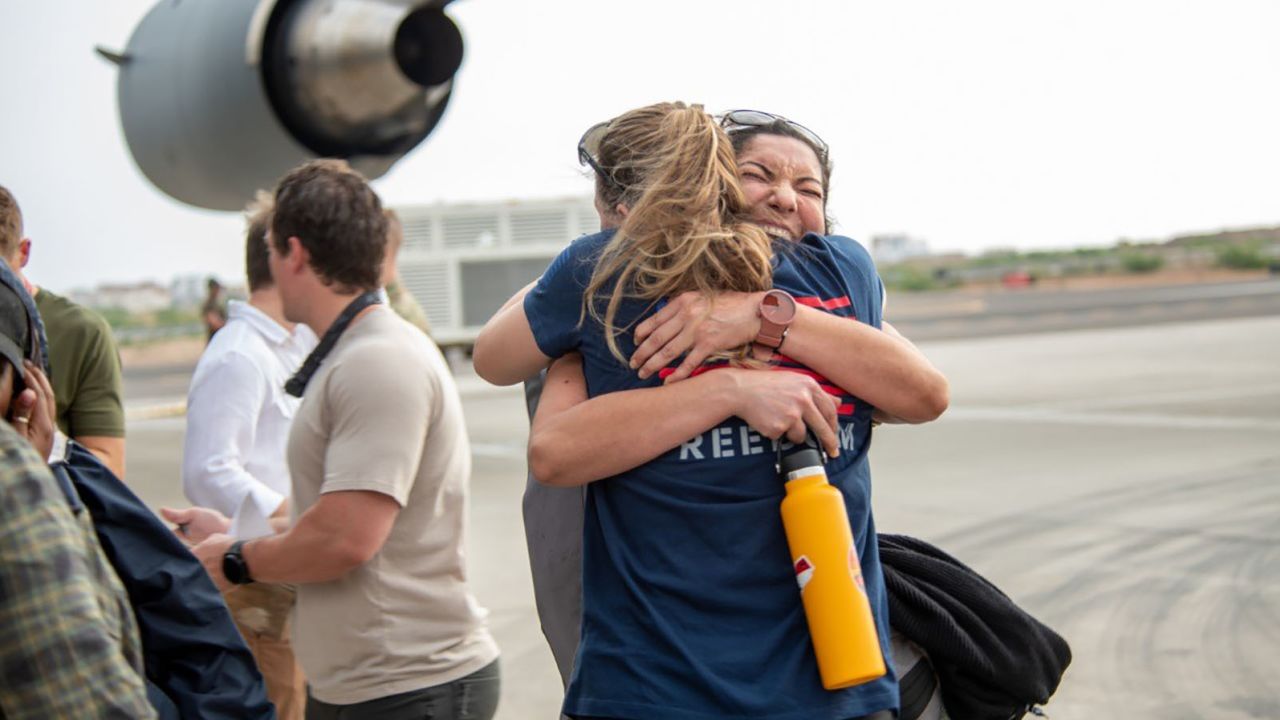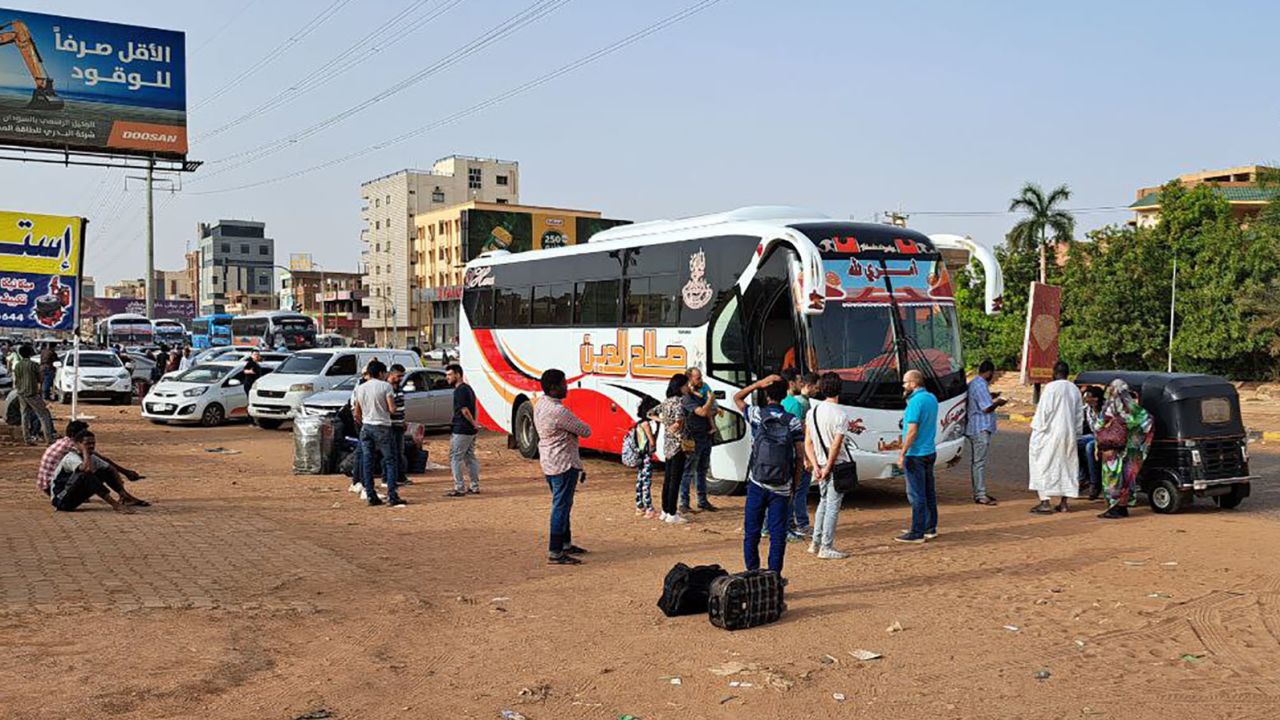[ad_1]
CNN
—
The World Health Organization warned Tuesday of a “huge biological risk” after Sudanese fighters seized the National Public Health Laboratory in the capital Khartoum, as foreign nations raced to mount rapid evacuation efforts from the country and violence punctured a fragile US-brokered ceasefire.
Gunfire and the roar of fighter jets was heard by CNN journalists in Khartoum on Tuesday, half a day after the announcement of a 72-hour truce raised hopes of opening up escape routes for civilians desperate to flee. Heavy clashes erupted between the Sudanese military and the Rapid Support Forces, the paramilitary group battling the army for control of the country, in the northern part of Khartoum state, eyewitnesses told CNN.
The two warring sides accused each other of violating the agreement.
The number of people killed in Sudan since violence broke out eleven days ago has reached at least 459 deaths, the World Health Organization also said on Tuesday, with at least 4,072 people injured.
A high-ranking medical source told CNN that the lab, which contains samples of diseases and other biological material, had been taken over by RSF forces. The WHO did not appoint blame for the lab seizure but said medical technicians no longer had access to the facility.
The RSF has denied taking control of the lab, telling CNN in a statement on Wednesday it had “no control over the laboratory.”
Nima Saeed Abid, the WHO representative in Sudan, described the development as “extremely dangerous because we have polio isolates in the lab, we have measles isolates in the lab, we have cholera isolates in the lab.”
“There is a huge biological risk associated with the occupation of the central public health lab in Khartoum by one of the fighting parties,” he added.
The WHO said in a statement to CNN that “trained laboratory technicians no longer have access to the laboratory” and that the facility had suffered power cuts, meaning “it is not possible to properly manage the biological materials that are stored in the laboratory for medical purposes.”
The power cuts also mean there is a risk of spoilage of depleting stocks of blood bags, according to the director-general of the laboratory.
The medical source told CNN that “the danger lies in the outbreak of any armed confrontation in the laboratory because that will turn the laboratory into a germ bomb.”
“An urgent and rapid international intervention is required to restore electricity and secure the laboratory from any armed confrontation because we are facing a real biological danger,” the source added.
CNN has reached out to the RSF for comment.
The United Kingdom, France, South Korea and a host of other countries confirmed Tuesday that they were pulling out nationals after US Secretary of State Antony Blinken announced that a three-day ceasefire had been agreed.
The White House is meanwhile considering a plan to send US troops to Port Sudan to help with the evacuation of American citizens, a US official with knowledge of the operations told CNN on Monday.
Three US warships are also being deployed off the coast of Sudan. A Navy official told CNN that the US is sending the USNS Brunswick to Sudan, one day after the Pentagon said the USS Truxton is already off the coast of the country and the USS Lewis B. Puller is on its way.
CNN’s team in Djibouti obtained images released by the US military showing personnel arriving in that country. France and Pakistan both said they had evacuated hundreds of nationals, while China said most of its citizens had also been pulled out of the country.

As many as 500 people fleeing the fighting have begun boarding the French frigate “Lorraine” in Port-Sudan on Tuesday afternoon, a spokesman for the French Chief of Defense Staff told CNN.
At least one US citizen, Dr. Bushra Ibnauf Sulieman, a Sudanese American physician, was killed in Khartoum on Tuesday.
Sulieman, who taught at the University of Khartoum, the oldest medical school in the country, died “after receiving fatal stab wounds in front of his house from unknown persons, according to the Preliminary Committee of Sudan Doctors’ Trade Union.
“Dr. Sulieman was murdered outside of his home due to the security situation in Sudan while he was escorting his father to a dialysis appointment,” said Dr. Yasir Elamin, President of the Sudanese American Physicians Association.
Previous ceasefires have collapsed within hours of being struck since clashes first gripped Sudan in mid-April. But the latest agreement, which Blinken said followed two days of “intense negotiation,” has raised hopes that it would open a window in which foreign nations could hurry citizens and staff to safety. According to a statement from the Sudanese Armed Forces, Saudi Arabia was also involved in mediating the truce.
On Tuesday, both sides of the conflict accused each other of breaking the truce. The armed forces said the paramilitary Rapid Support Forces (RSF) were moving military convoys to the capital in order to carry out a large scale military operation, had deployed snipers in parts of Khartoum, and were conducting operations near embassies. The army did not provide evidence for the claims.
The RSF blamed the army for violating the truce by “continuing to attack Khartoum by planes.” Eyewitnesses told CNN that fighter jets were heard over Omdurman to the north of the capital.
As the conflict rages on through its second week, water supplies are scarce and food is “running out” in Khartoum state, a witness told CNN on Tuesday.
“Shops are running out of food completely” and several food factories in the state had been looted, the witness, who asked to remain anonymous for security reasons, told CNN.
“As for the water supplies, we don’t have water for the eleventh day continuously. We only get water from a well nearby. So you have to go all the way to the well with barrels or stuff if you have a car or stuff. If not you have to take something small to get enough water for you,” the witness said.
Saif Mohamed Othman, 51, a freelancer who resides in Shambat, North Bahri, told CNN on Tuesday that food stocks have run out in stores, made worse by the complete burning of the central market, which supplies large parts of Bahri with vegetables, meat and other food.
Residents are also struggling financially because state employees had not received their wages since before the Eid al-Fitr holiday at the end of last week, and the bank’s ATMs have stopped functioning, Othman told CNN.
Othman told CNN there are patrols in place to protect the neighborhood from the widespread looting and robbing that large areas in Khartoum have been exposed to due to the lack of security and police presence.
On Monday, the United Nations Office for the Coordination of Humanitarian Affairs (UNOCHA) warned that shortages of food, water, medicines and fuel are becoming “extremely acute” in Khartoum and surrounding areas.
“Access to health care, including sexual and reproductive health care, has been critically impacted by the conflict,” UNOCHA added. “Displacement of civilians continues to be reported in Khartoum, Northern, Blue Nile, North Kordofan, North Darfur, West Darfur and South Darfur states, as well as cross-border movements to surrounding countries.”

Many Sudanese people caught in the middle of the fighting have attempted to make their own perilous escapes from the capital, taking advantages of brief breaks in combat to rush to safety.
Sudan has been racked with violence since a bloody power struggle between two rival generals spilled into the streets, with forces loyal to each man engaging in combat on the streets of Khartoum and in towns around the capital.
Over the course of fighting, the RSF and Sudanese military have issued statements discrediting one another, with unsubstantiated claims of their control over key posts of the capital and accusations of each side targeting civilians.
On Monday, the Sudanese military claimed that the RSF killed an Egyptian diplomat, while the RSF claimed the army targeted civilians in an airstrike on a Khartoum neighborhood. Neither group provided evidence for the claims.
[ad_2]

















